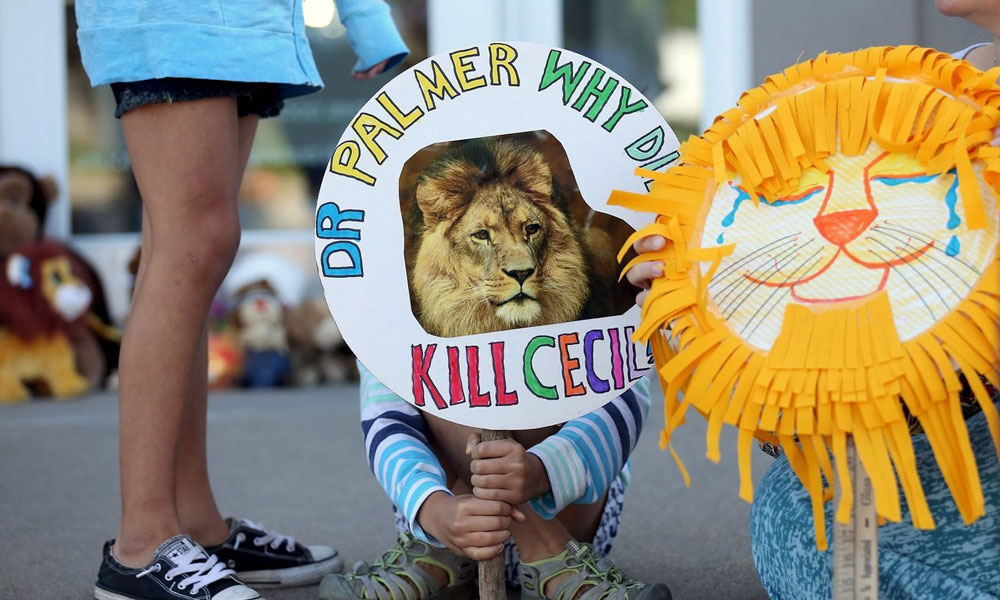
The Associations Responding to the Death of Cecil the Lion
In Zimbabwe, a safari group in the country is taking a lead role in responding to the death of Cecil the lion at the hands of a trophy hunter. In the U.S., meanwhile, American animal-rights groups are denouncing, in the harshest of terms, the popular lion's death.
The significance of Cecil the lion’s death hasn’t been lost on the public, which has expressed great dismay over the death of the famous Zimbabwean lion, apparently at the hands of an American trophy hunter.
But as investigators have been busy trying to figure out exactly what happened to Cecil, a safari assocaition in the country has stepped up to assist with the investigation into how Walter Palmer, a Minnesota dentist, was allowed to kill the lion that drew tourists to the Hwange National Park.
Emmanuel Fundira, president of the Safari Operators Association of Zimbabwe (SOAZ), publicly confirmed that Palmer is the hunter who killed Cecil, saying in a statement to The Telegraph, “This animal was shot at 10 o’clock at night, using a bow and arrow.”
In a joint statement with the Zimbabwe Parks & Wildlife Authority, SOAZ emphasized that neither Palmer nor his assistants—professional hunter Theo Bronkhorst, and Honest Trymore Ndlovu, whose land was used in the hunt—had any legal right to hunt the lion. Bronhorst’s hunting license was suspended as a result of the incident, and the two men face charges.
In comments to AFP, Fundira emphasized that everyone in Zimbabwe’s tourism industry is heartbroken about the event.
“He had this black mane and because of that he drew a lot of interest internationally, that’s why he became an icon in the tourism industry,” Fundira said. “Cecil was our main tourism attraction at Hwange. His death is a loss to the tourism sector.”
American Groups React Strongly
Outside of Zimbabwe, Cecil’s death has led to responses from animal- and hunters’-rights groups, who have denounced Palmer’s actions.
“Cecil the lion is dead because Walter Palmer the dentist is a morally deadened human being,” wrote Wayne Pacelle, president and CEO of the Humane Society of the United States.
In his note, Pacelle noted that the association this week asked that the U.S. Fish and Wildlife Service “to upgrade the legal status of lions, to restrict people from trekking to Africa and bringing back their parts for no good reason.”
And People for the Ethical Treatment of Animals (PETA) took such a hard-line stance that it led to some online criticism.
“If, as has been reported, this dentist and his guides lured Cecil out of the park with food so as to shoot him on private property, because shooting him in the park would have been illegal, he needs to be extradited, charged, and, preferably, hanged,” the group’s official statement said.
The Washington Post‘s Michael E. Miller noted that, although harsh, the stance isn’t unusual for PETA.
“The statement isn’t out of character for the organization, which has earned a reputation as the one of the most radical defenders of animal rights,” Miller wrote.
Meanwhile, Safari Club International, an organization formed to protect hunters’ rights and promote wildlife conservation, announced in a statement Wednesday that it “has imposed immediate emergency membership suspensions of both the involved hunter and his guide/professional hunter, and they will remain in place pending the outcome of an investigation,” adding that it “believes that those who intentionally take wildlife illegally should be prosecuted and punished to the maximum extent allowed by law.”
Piper Hoppe, 10, from Minnetonka, Minnesota, holds a sign at the doorway of River Bluff Dental clinic in protest against the killing of a famous lion in Zimbabwe. (Eric Miller/Reuters)






Comments